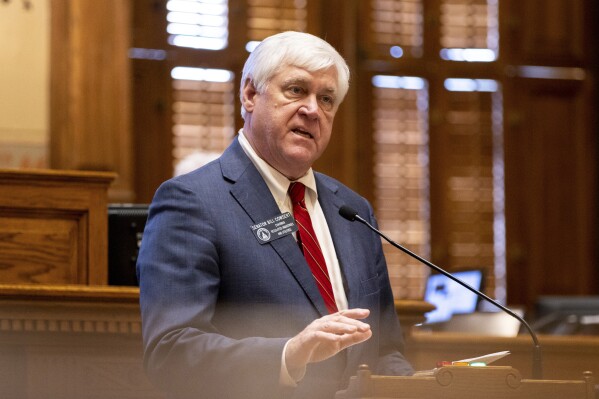Georgia will spend $392 million to overhaul its gold-domed capitol and build new legislative offices
ATLANTA (AP) — Georgia’s lawmakers are moving not only to regild the iconic dome on state Capitol, but the entire complex.
Lawmakers on Monday with little dissent agreed to spend $392 million to build a new legislative office building for themselves and to renovate the 1889 Capitol building.
Gov. Brian Kemp approved increasing state spending to pay for the project, saying lawmakers expressed a “strong desire to address the long-term capital needs for our historic Capitol building and the surrounding area.”
Kemp must still sign the bill, which boosts spending of state revenue by almost $5.5 billion over the $32.5 billion that lawmakers approved last year.



Senators and House members agreed to a state budget that would include money for $1,000 bonuses already paid to state employees and teachers, additional roadbuilding, new dental and medical schools, and paying down some state debts. Kemp must sill sign House Bill 915, which adds money to the budget running through June 30.
Total spending, including federal aid, college tuition, fines and fees, would rise to $68 billion.
Plans call for an eight-story building across Martin Luther King Jr. Drive from the north side of the Capitol in downtown Atlanta, said Gerald Pilgrim, the deputy executive director of the Georgia Building Authority. The site includes two smaller state office buildings that are partly vacant.
“This budget provides a once-in-a-lifetime opportunity to pay cash and the full cost to protect the safety and security of building occupants and improve public access to the Capitol Hill complex, for the construction of a new legislative office building, as well as over $83 million to restore the historical integrity of this building that was built so long ago,” House Appropriations Committee Chairman Matt Hatchett, a Dublin Republican, told House members Monday.
Georgia’s not alone. Alabama is constructing a new building to hold chambers for its House and Senate. Kansas used $60 million in federal pandemic relief funds to help demolish an obsolete state office building and replace it with a smaller structure designed to host meetings and events, a decade after completing a 13-year renovation of its capitol that cost more than $330 million. California is engaged in a $1 billion revamp of its capitol grounds, including tearing down old offices and replacing them with a new building, parking garage and visitor’s center.
Most lawmaker offices and committee rooms are in the Coverdell Legislative Office Building, on the south side of the Capitol. That structure was built as an office building for state health agencies and renovated for lawmakers in the 1980s. Many lawmakers complain they don’t have conference rooms to meet with staff and constituents. Pilgrim noted that heating and mechanical systems need replacement and that committee rooms are often obstructed by columns.
“We’re bursting at the seams in this Capitol and across the street in the CLOB,” Hatchett said.
Architects also made a $208 million proposal to renovate the Coverdell building. But it would have produced less new space, allowing for fewer changes to the Capitol. Plus, members would have had to decamp to portable trailers in a parking lot for two years during renovations. Instead, Kemp and lawmakers opted for the plan to build the new structure with 260,000 square feet (24,000 square meters) and a parking garage with 500 spaces.
Construction could start in October and be complete by the end of 2026, allowing it to be used for the 2027 legislative session, if the state can meet what Pilgrim calls “an aggressive schedule.” It would include new offices and committee rooms for lawmakers, a reception area for visiting groups, and a skybridge to the capitol.
The plan also includes a renovation of the Capitol to improve heating and air conditioning systems and fire safety and to restore some historic features that have been obscured by prior renovations, Pilgrim said. Some of that work, including refurbishment of the House and Senate chambers and laying a thin new layer of Georgia gold on the Capitol dome, could start this year.
Other work is likely to wait until after the new legislative office building is completed. The plan calls for creating two walled fire stairways. Architects warn that in case of a fire, stairways in Capitol atriums could become obscured by smoke. Pilgrim said air circulation systems are needed because the building was designed for windows to admit fresh air, while now windows are sealed for air conditioning.
The renovation would also remove some offices stuffed into mezzanine levels built into rooms that once had towering ceilings. Particularly, a grand library now chopped up into offices would be restored, Pilgrim said.
Disclaimer: The copyright of this article belongs to the original author. Reposting this article is solely for the purpose of information dissemination and does not constitute any investment advice. If there is any infringement, please contact us immediately. We will make corrections or deletions as necessary. Thank you.





